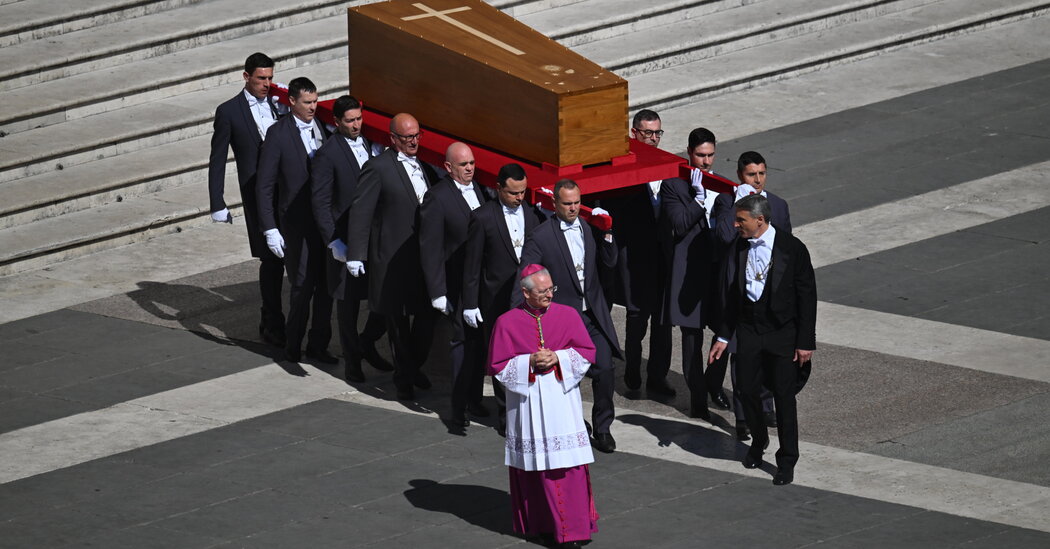The life and legacy of Pope Francis — a pontiff who defied easy definition and led the Roman Catholic Church through a dozen years of different phases and contradictions — are not easy to fit into a single homily.
But that was the task for Cardinal Giovanni Battista Re, the dean of the College of Cardinals, on Saturday.
“He was a pope among the people, with an open heart toward everyone,” Cardinal Re said beside Francis’ coffin from the steps of St. Peter’s Square. “He was also a pope attentive to the signs of the times and what the Holy Spirit was awakening in the church.”
As the cardinals arrayed around him prepared to head into a conclave next month to choose Francis’ successor, Cardinal Re, 91, avoided obvious political overtones. But by highlighting Francis’ pastoral and inclusive approach, and his humble style, Cardinal Re’s tribute sought to remind the tens of thousands of faithful at St. Peter’s Square, the dozens of assembled heads of state and dignitaries, and — perhaps most important — the cardinals responsible for picking Francis’s replacement what made him such an esteemed figure inside and outside the church.
“The guiding thread of his mission was also the conviction that the church is a home for all, a home with its doors always open,” Cardinal Re said.
He said that Francis had spread the faith with a sense of joy, a “great spontaneity and an informal way of addressing everyone,” and a spirit of “welcome and listening.” But Francis also “truly shared the anxieties, sufferings and hopes of this time of globalization.”
With President Trump seated a few yards away, Cardinal Re recalled the late pope’s trip to the border between Mexico and the United States, one of his many “gestures and exhortations in favor of refugees and displaced persons,” when Francis spoke of the need to “build bridges, not walls.”
Cardinal Re said that Francis’ pastoral style and “resolute personality” had immediately made a mark on the church, and that the pontiff had been “eager to be close to everyone, with a marked attention to those in difficulty, giving himself without measure, especially to the marginalized, the least among us.”
The Cardinal spoke of Francis’ rise through the hierarchy to become pope and said his decision to take the name Francis, after the medieval saint dedicated to caring for the poor, “immediately appeared to indicate the pastoral plan and style on which he wanted to base his pontificate.”
He described Francis as a simple pastor who until his last day followed in the footsteps of Jesus, who loved his flock “to the point of giving his life for them,” because he believed it was better to give than to receive.
Cardinal Re walked through Francis’ milestones in the church, his protection of the environment, his work healing wounds between religions, including a document on human fraternity that he signed with Muslim leaders in the United Arab Emirates, and his frequent calls to stop war and conflict. He recalled how Francis physically reached out to the world’s peripheries, seeking to heal wounds and spread seeds of faith.
“The outpouring of affection that we have witnessed in recent days following his passing from this Earth into eternity tells us how much the profound pontificate of Pope Francis touched minds and hearts,” Cardinal Re said.
He said the enduring image of Francis would be that of Easter Sunday, the day before his death when, despite being obviously ailing, he came to a balcony overlooking St. Peter’s Square to deliver his blessing and then greeted the crowd.
Recalling that Francis often ended talks with an invitation to pray for him, the cardinal concluded, “Dear Pope Francis, we now ask you to pray for us.”





